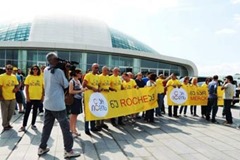By Irma Kakhurashvili
8.08.2013
It is several kilometers from Tbilisi to Gori. Gori is a small city where activists fighting Hepatitis C. Among the activists there are representatives of several non-governmental organizations that are part of the Georgian Harm Reduction Network, as well as representatives of Medecins du Monde – France Representation in Georgia and Open Society Georgia Foundation. I am together with them as well, wearing a yellow T-shirt with “C Does Not Wait” in big letters and this is the bitter reality. Several of my friends as well as up to 200,000 citizens of Georgia are suffering from Hepatitis C. They do not have much time left if they do not undergo timely treatment.
Compared to many other countries in the world, Hepatitis C treatment in Georgia is very expensive. For the majority it is unaffordable. Reducing artificially increased prices on medicines – this is one of the main messages of our action, which should be voiced during the two-day tour of the international week for fighting Hepatitis C.
After Gori, the wave of yellow T-shirts will arrive in Kutaisi and Zugdidi and end on Batumi Boulevard with a concert.
There is the hope that the problem of hepatitis C treatment will be resolved in the nearest future. Starting from autumn 2013, the Ministry of Corrections will launch the Program of Prevention, Diagnostics and Treatment of Hepatitis C for the first time. Eighteen percent of deaths in prisons are due to cirrhosis caused by Hepatitis C. 6 million Gel are needed for implementation of this program.
Until 2016 the program will expand and ensure universal accessibility of treatment for everyone, including my friends who had been trying to interest Georgian politicians in the issue with the help of foreign donors for years.
It seems that their goal has almost been achieved – the government realizes its political obligation on treatment of the patients. Now the most important thing is to conduct successful dialogue with the pharmaceutical companies and reduce the prices for treatment.
Close-up of the challenge
According to the World Health Organization, 180 million people all over the world, which makes-up 3 percent of the entire population of the earth, are infected with C Hepatitis. Every year 1.5 million people die of B or C Hepatitis. The number of hepatitis patients is 10 times greater than HIV/AIDS patients. And the majority of them do not know about the disease.
In Eastern Europe and Central Asia, Georgia has the highest rate of hepatitis C and the lowest accessibility for treatment.
Out of the six genotypes of hepatitis C, the first three are spread in Georgia. During the second and third genotypes, after six months of treatment, there is a 60-80 percent probability of recovery. As for the first genotype, after a year of treatment, there is a 40-50 percent probability of recovery.
Diagnosis of hepatitis C in Georgia costs 1,600 Gel, a 48 week course of treatment costs up to 27,000 Gel. Until now, only 2,000 people have managed to receive treatment with their own funds. The Georgian government induced by civil society and groups of patients is holding negotiations with monopolist pharmaceutical companies producing interferon – Merck and Roche.
State office representatives said that prices on medicines should be reduced at least four times from what it is now. According to the Ministry of Health data, currently 47,500 patients need urgent treatment. Based on preliminary calculations, the cost of treating these patients is 98 million Gel.
Recently, loud demonstrations were held at the representations of Merck and Roche pharmaceutical companies in Georgia. Before that roundtables were arranged. Activists say that these companies should not put the lives of people behind commercial profits, especially in a country where “there is a catastrophic situation with regards to Hepatitis C.”
Members attending the event in Gori think that despite the fact that there is the political will, it is necessary for civil society to realize the problem of Hepatitis C. Involvement of civil society in advocating the issue is of great importance.
Activists visiting Gori were joined by local NGOs and residents. The small action in front of the City Hall ended peacefully and the action members left for Kutaisi where another action will take place in front of the parliament, attracting the attention of Kutaisi media.
Zugdidi showed solidarity to the activists fighting against Hepatitis C. A thematic flash-mob is held there demanding accessibility of treatment. People take interest in informational booklets distributed by the activists. The situation in the region in terms of spreading Hepatitis is quite hard.
On the next day, the activists move to the rainy streets of Batumi and divided in groups hold mini informational campaigns in crowded places– cafes, cinemas, shops, beauty salons etc. I enroll in the action so actively that I almost forget my professional duties.
Despite bad weather, Batumi residents and guests of Adjara gather in the boulevard at Alphabet Tower to hold a free concert within the frames of the “C Does Not Wait” campaign. The concert has many listeners. Now more people know what Hepatitis C is and the scale of the epidemic in the country.
Editor’s note: This article has been produced within the frames of the European Union funded project: “Harm Reduction - an oppression or the evidence based interventions: promoting empowerment, awareness and informed policy responses in Georgia” implemented by the Georgian Harm Reduction Network. The project is co-financed by Medecins du Monde- France Representation in Georgia. The contents of the article are the sole responsibility of the author and can under no circumstances be regarded as reflecting the position of the European Union.

No comments:
Post a Comment